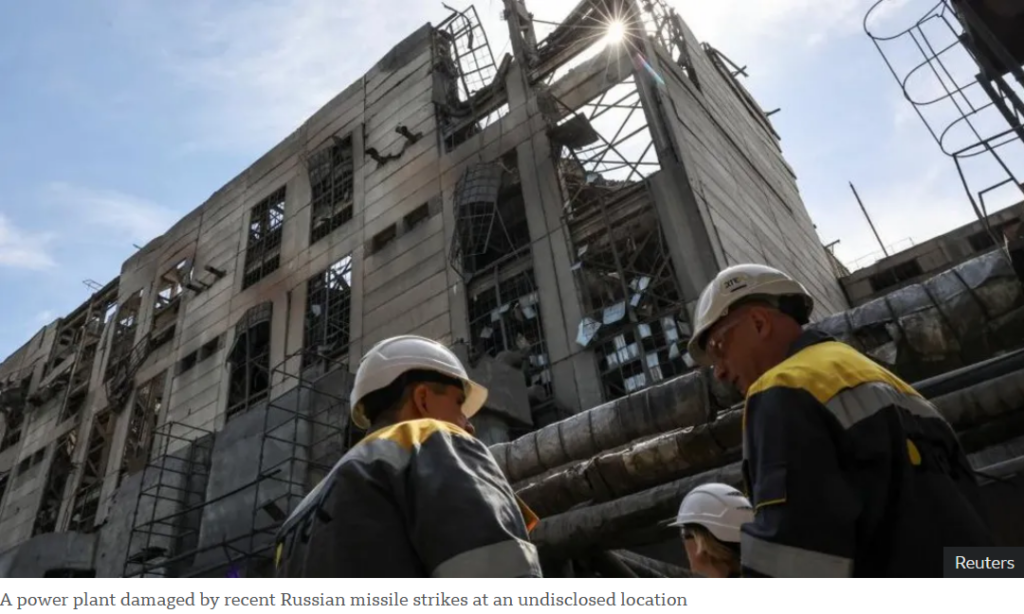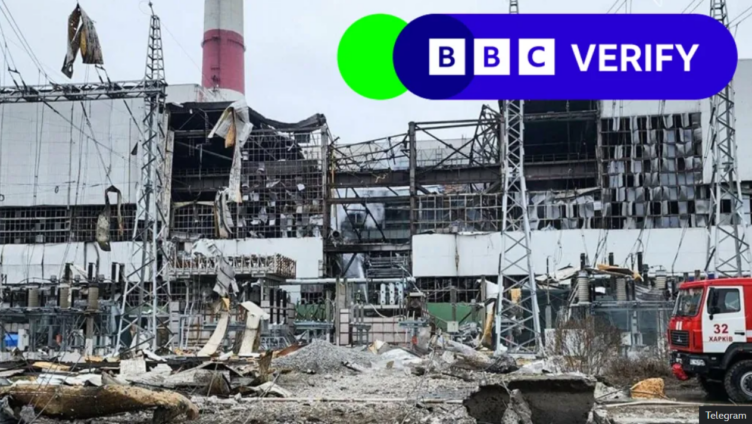People in several regions of Ukraine have been experiencing power blackouts after the latest wave of Russian attacks on the country's energy infrastructure.
President Volodymyr Zelensky said there had been missile and drone attacks on critical energy facilities in seven regions.
BBC Verify has been tracking Russian strikes on energy targets in the past months and industry experts have said Russia has been shifting its strategy - increasingly targeting power plants to try to disrupt energy supplies to Ukrainians.
In posts on social media, Mr Zelensky said more than 50 missiles and 20 drones had been fired by Russia on Tuesday, hitting facilities in the Lviv, Vinnytsia, Kyiv, Poltava, Kirovohrad, Zaporizhzhia, and Ivano-Frankivsk regions.
Ukraine's national electricity company, Ukrenergo, said there were new blackouts in nine regions and warned of possible power cuts across the country on Wednesday evening as a result of the new damage and ongoing fighting.

Before the most recent Russian attacks, our analysis verified damage to 12 facilities and Ukrainian authorities have reported at least a dozen more hit - with the impact ranging from them running at significantly reduced capacity to being taken entirely out of commission.
On 22 March, a series of air strikes hit power plants across Ukraine.
One thermal plant in Kharkiv was destroyed, according to government-run energy company Centrenergo. An image of it, which we have verified, shows a hole blown in the centre of the building that served Ukraine's second-largest city.
Russia also hit the two power plants run by private firm DTEK - one in Ladyzhyn in central Ukraine and another in Burshtyn in the west. DTEK said at the time, without specifying which, that some of its facilities had been destroyed totally and others were running at around 50% capacity.
You can see the extent of the damage to the Ladyzhyn plant in satellite images from before and after the strikes.

Other key facilities we have verified as being hit on this day include Ukraine's largest hydroelectric power station in Zaporizhzhia, where a fire broke out at the facility on the vast dam spanning the Dnipro river.
Strikes on three different hydroelectric plants followed a week later.
Footage posted on social media on 29 March showed two big explosions at the Kremenchuk Hydroelectric Station in central Ukraine, although satellite imagery of it is not conclusive about the level of damage.
A third wave of attacks came on 11 April, including the destruction of the Trypillya power plant in Kyiv. Footage of it on fire went viral on social media and received significant media coverage.
This is the only strike BBC Verify has been able to corroborate from that night, but Ukrainian authorities also reported damage to plants in Sumy, Zaporizhzhia and Odesa.
More hits were reported on 27 April and then again on 8 May, though we have not been able to find any verifiable footage of these so far.
This is largely because the publishing of images or videos of strikes on key infrastructure is banned under martial law in Ukraine.

Russia has carried out frequent and widespread attacks on Ukraine's power infrastructure since the beginning of its full-scale invasion in 2022, but one expert told BBC Verify that its tactics have changed in recent months.
Volodymyr Omelchenko, director of energy programmes at the Ukraine-based Razumkov Centre think tank, said Russian forces have been targeting larger energy generation infrastructure over smaller substations - as power plants take longer to fix.
As of mid-April, he said Ukraine had lost more than 80% of all thermal generation capacity, on top of the destruction of Ukraine's largest hydroelectric power station.
Mr Omelchenko added he believes the attacks are aimed at creating a "socio-economic collapse" in Ukraine, rendering the country essentially impossible to live or run a business in.
"Moscow hopes that the collapse of the energy sector will force millions of people to emigrate," he warned.

Another energy industry expert told BBC Verify the focus on thermal and hydroelectric generation plants was also intended to reduce the flexibility of Ukraine's grid, as they can supply power regardless of the time of day or weather conditions.
The damage to the facilities, according to Olena Lapenko from the DiXi group think tank, means Ukraine's national energy company has been forced to import power from neighbouring countries to meet peak demand in the evening.
She believes the missiles have been targeting turbines and generators - elements which are the most complex to fix and expensive to replace.
"The goal of the Russians is obvious - to plunge Ukraine into darkness and leave the Ukrainian economy without electricity, undermining defence capabilities."
The Ukrainian military has also responded with its own series of drone strikes on Russian oil depots and refining facilities in recent months, which BBC Verify has looked at previously.
Additional reporting by Benedict Garman and Joshua Cheetham.
Latest Stories
-
‘Energy crisis beyond politics’ – Prof Bokpin urges urgent reform under IMF mandate
23 minutes -
Faith Ladies come from behind to beat Jonina Ladies to win Women’s FA Cup
28 minutes -
‘ECG’s collection losses at 15%, distribution at 40% not sustainable’ – Prof Bokpin warns
59 minutes -
‘You’re not powering an 8-Hour economy, but promising 24 Hours?’ – Prof Bokpin on energy sector failures
2 hours -
Gary Lineker expected to leave the BBC
2 hours -
Pope Leo XIV calls for unity at inaugural mass and meets Zelensky
2 hours -
Kenya’s ex-justice minister ‘deported’ from Tanzania
2 hours -
‘I was refused service in a cafe because of my face’
3 hours -
Alcaraz ends Sinner’s streak to win Italian Open
3 hours -
A tale of nine points, the 99th minute – how Ajax blew title
3 hours -
Publicis West Africa, Empire Marcomm forge strategic alliance to transform marketing innovation
4 hours -
Nigerian pastor acquitted of rape to leave South Africa
4 hours -
Policy rate to be held steady – Databank Research
4 hours -
Biden diagnosed with ‘aggressive form’ of prostate cancer
4 hours -
‘We are unsatisfied and upset’ – Arteta on Arsenal season
4 hours

